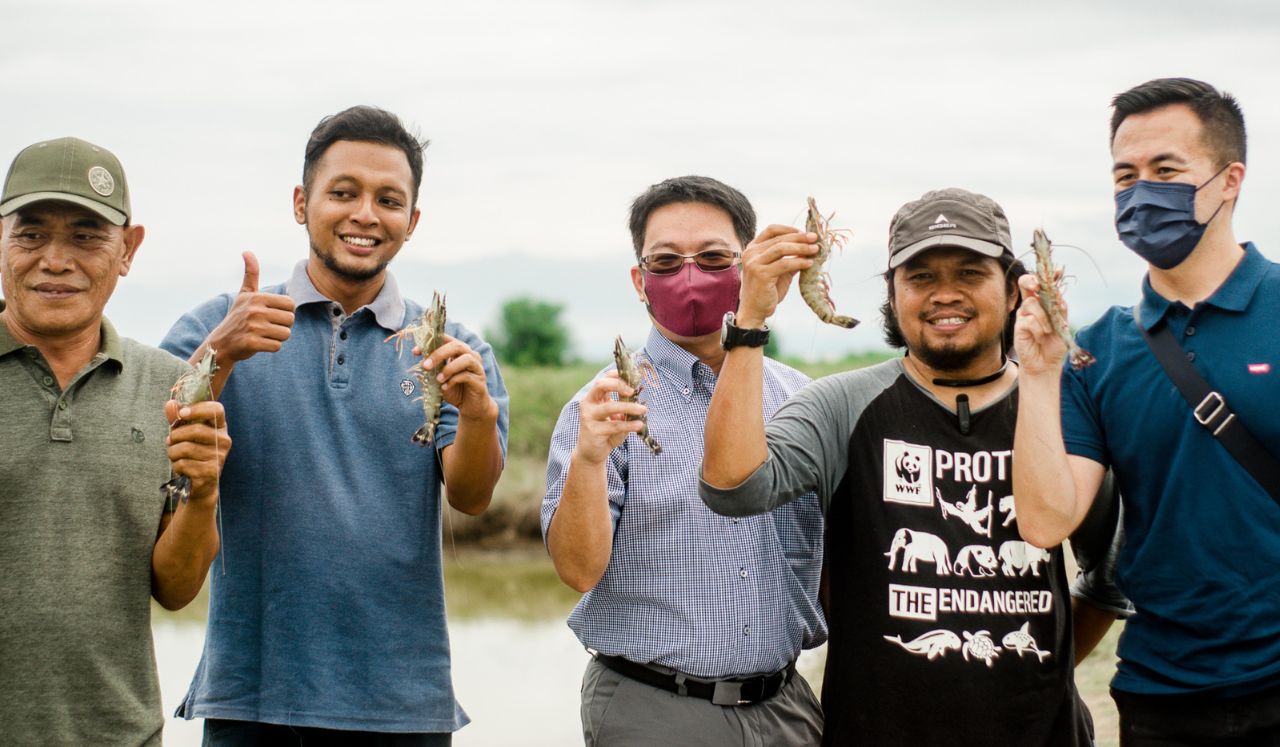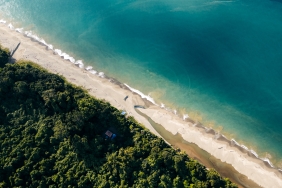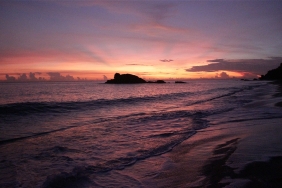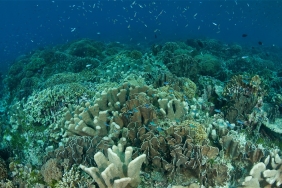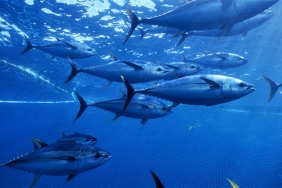WWF: TRADITIONAL TIGER SHRIMP FARMING CAN BE ENVIRONMENTALLY FRIENDLY
PRESS RELEASE: FOR IMMEDIATE RELEASE
Tarakan City Government Pilot Pond Trial, Cooperation with WWF-Indonesia
Tarakan, East Kalimantan- Tarakan municipality through the Department of Marine & Fisheries (Diskanlut) and WWF-Indonesia Wednesday (31/7) signed a cooperation agreement for the adoption of environmentally friendly management practices or Better Management Practice (BMP) of Feedless and Aerationless Wind Shrimp Cultivation in pilot ponds in Tarakan City, East Kalimantan. This program specifically helps traditional tiger shrimp farmers.
BMPs are guidelines issued by WWF-Indonesia to help implement fisheries practices that are socially responsible and economically sustainable and environmentally sustainable in Indonesia. These BMPs are compliant with Aquaculture Stewardship Council (ASC) standards for aquaculture or Marine Stewardship Council (MSC) standards for capture fisheries.
>
"This cooperation program is in line with the direction of the central government, which is to increase the production of traditional tiger shrimp farming in accordance with national and international standards so that it can reach a wider market," said Abidinsyah, Head of the Marine and Fisheries Service of Tarakan City. Further Sofyan Raka, Assistant II Secretary of Tarakan City explained " Shrimp is one of the mainstay export products of Tarakan City, which in the last 5 years the production level ranges between 7,000 - 10,000 tons per year."
.
|
|
|
The atmosphere of the signing of the cooperation agreement. Left: WWF Marine Program Director, Wawan Ridwan; Right: Abidinsyah, Head of Marine and Fisheries Department of Tarakan City. © WWF-Indonesia / Aquaculture
|
With a large potential of cultivated land, Indonesia faces challenges in terms of shrimp farming, especially from the technical side. So it is necessary to take action strategically involving all important stakeholders in the world of shrimp farming, namely the main actors, entrepreneurs, associations, policy makers, banks, and non-governmental organizations." explained Agus Surono, Head of Sub-Directorate of Brackish Water and Marine Aquaculture, DJPB - KKP.
As one of the shrimp production centers with a capacity of around 10,000 tons per year with the largest target of the Japanese market, Tarakan has a big challenge because the export market applies strict rules, starting from the legality aspects of the pond, the cultivation process, to the post-harvest process must comply with the principles of biodiversity safety, food safety and environmental preservation. Under these conditions, shrimp farmers in Tarakan and Indonesia in general must start anticipatory steps by applying the principles of environmentally friendly and responsible farming.
"This 'green' trend is starting to enter all commodities, including shrimp farming," said Wawan Ridwan, Director of Marine Programs at WWF-Indonesia."WWF offers this No Feed and No Aeration Shrimp Farming BMP, and Tarakan City Government through Diskanlut Kota Tarakan is the first to officially adopt this system at the government level. Therefore, we fully support and also invest in this program for a period of at least one year," he continued.
.
This collaboration aims to socialize BMPs to shrimp farmers in Tarakan City and implement them on a 5-hectare pilot farm, so that in addition to complying with the Good Aquaculture Practices (CBIB) issued by the Ministry of Marine Affairs and Fisheries (MMAF), it also complies with the principles required by the Shrimp Aquaculture Dialogue (ShAD - ASC) standards.
Present at the signing ceremony were representatives of the Mayor of Tarakan, namely Assistant II for Economy and Development; Ir. Sofyan Raka, M.Si, representatives of the Directorate General of Aquaculture, Ministry of Marine Affairs and Fisheries (DJPB - KKP), namely the Head of Sub-Directorate of Brackish and Marine Aquaculture; Ir. Agus Surono, MM, representatives from Tarakan City Bappeda, Tarakan City Environmental Agency, PT Mina Mustika Aurora, Tarakan Borneo University, and the "Tambak Mandiri" pilot cultivation group.
Candhika Yusuf, Aquaculture Coordinator in WWF-Indonesia's Marine Program, explains, "In the next 6 months , this pilot pond is expected to produce shrimp that can be categorized as close to environmentally friendly and responsible. In addition, we are also working with a shrimp processing company and eks exporter in Tarakan City as one of the solutions for marketing the products that will be produced."
This cooperation program consists of three stages, namely; the preparation stage, preparing the legal administration of the farmer group and the preparation of the pond land; the implementation stage, where WWF-Indonesia and Diskanlut Tarakan City share roles in the physical improvement of the pond, the purchase of high-quality shrimp fry, technical assistance in cultivation in accordance with BMP, as well as group organization; and the evaluation and reporting stage. For this collaboration, the Diskanlut of Tarakan City allocates its budget from the Rural Aquaculture Business Development Program (PUMP PB), Directorate General of Aquaculture, Ministry of Marine Affairs and Fisheries in 2012.
.
This trial is expected to provide lessons learned on the implementation of this BMP to be replicated on other ponds in Tarakan and surrounding areas.
The DGPB would like to express its appreciation to WWF-Indonesia for working with the farmers in Tarakan and surrounding areas and hopefully this collaboration can serve as an example for other stakeholders to participate and play a role in fostering farmers to increase productivity and maintain environmental sustainability. This can ultimately improve the welfare of the farmers themselves." said Agus Surono.
.
***
For more information:
- Candhika Yusuf, Aquaculture Coordinator, WWF-Indonesia Marine Program, +62 8115410512, cyusuf@wwf.or.id
- M. Budi Santosa, Fisheries Officer - Tarakan, WWF-Indonesia Marine Program, +62 8118004430, msantosa@wwf.or.id
Note to the Editor:
-
About Better Management Practice: WWF-Indonesia has so far issued nine responsible fisheries guidelines that can be used by fisheries practitioners according to their designation. The available BMPs are:
1.
Tiger Shrimp Pond Cultivation BMPs, No Feed and No Aeration
2.
!--[endif]-->Tiger Shrimp Farming BMP, With Feeding and Without Aeration
3.
BMP for Preventing and Overcoming Tiger Shrimp Diseases in Traditional and Semi-Intensive Pond Farming
4.
BMP for Grouper Cultivation
5.
Tilapia Aquaculture BMP
6.
!--[endif]-->Tuna Fishery BMP
7.
!--[endif]-->BMP Grouper and Snapper Fisheries
8.
BMP for Environmentally Friendly Longline Operation
9.
BMP for Handling Sea Turtles as Bycatch in Longline and Trawl Fishing Gears
Tiger Shrimp Aquaculture BMP, No Feed and No Aeration was generated from the experience of pilot farmers in 2 locations in Indonesia, namely in Aceh and Tarakan, using the basic principles of ShAD - ASC, and based on input from competent experts.
About WWF-Indonesia:
- WWF-Indonesia is a national conservation organization in the form of a foundation that is part of the WWF global network, the largest and most experienced independent conservation network in the world. WWF-Indonesia is active in 27 fieldwork areas in 17 provinces.

